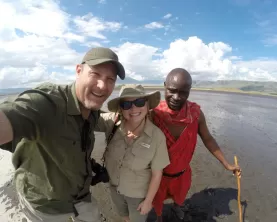TrustScore 4.8 | 174 reviews
TrustScore 4.8 of 5

Based on 174 reviews on


1 day ago
The trip was not only memorable for the amount of animals we saw but also for the people and accommodations at the two camps where we stayed. Our first guide, BK, was a wealth of information about the animals, landscape and down to the plants and what they were used for. Everyday out was a learning experience with him. All the people at the camps were gracious and the food was excellent.
Our second camp in the Okavanga was just as good as the first as far as the staff, accommodations, food and animals. After our experience at the first camp we amazed that the high quality remained the same. Our guide, G, made sure we were able to enjoy every experience including a rush through the bush to witness a cheetah and an ensuing hunt that he heard over his radio.
In both camps there were enough guides out that if they saw something the other guides were informed which helped in seeing as much as possible. It was also nice that the concessions were large enough that we did not have vehicles following each other throughout the day.
Normally there is always something in a trip of this length that we think could be improved upon but this is the rare case where we cannot think of anything. From the time we left the States to when we returned it was one of the most hassle free vacations we took.
Perhaps emphasizing the use of the laundry facilities at the camps would be useful because of the luggage restrictions would be the only thing I can think of as an improvement to future clients.
Kenneth Dropek

2 days ago
Mary was so pleasant and professional. She made sure all of our questions were answered.
Tina

3 days ago
Rapid response.
kym

3 days ago
Jess and her non pushy salesmanship!!!!!
Cristen Crawford

3 days ago
Mary Curry. And AL’s discount policy.
Customer













